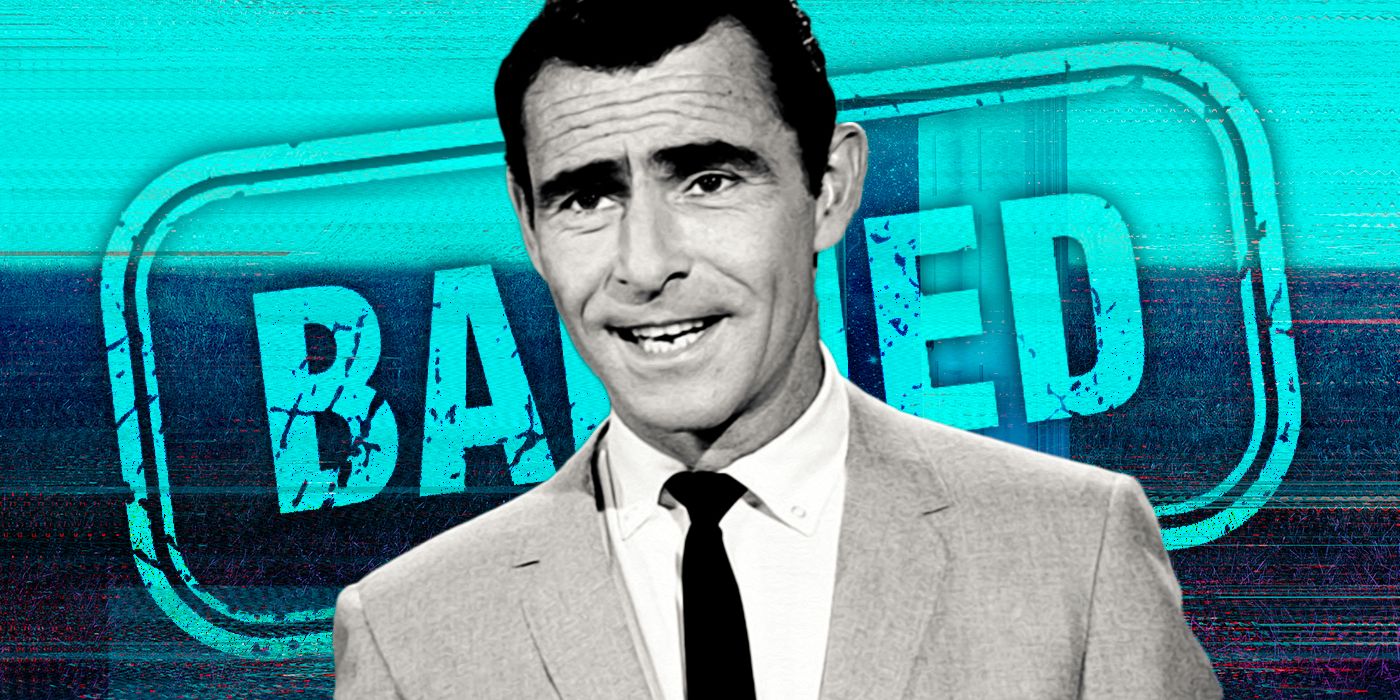
Why One Twilight Zone Episode Was Banned for Decades
The Twilight Zone’s "The Encounter" was kept out of circulation for 50 years due to problematic content. Here’s why the classic episode went missing.
Rod Serling in black and white in front of a blue banned sign.
Debuting in 1959, The Twilight Zone thrived in large part because of recirculation. The science fiction / horror anthology series spent decades in syndication, winning over new generations of fans with each viewing. However, not every episode in its five-year run reappeared after its original airing. A handful were pulled from circulation for different reasons and remained unavailable for long periods of time. This included one banned Twilight Zone episode titled "The Encounter", which didn't return to television for more than 50 years.
In many cases, a pull from circulation involved intellectual-property rights, like Season 5, Episode 22, "An Occurrence at Owl Creek Bridge." Originally produced by a French company, The Twilight Zone lacked permission to air it after the initial run. "The Encounter," however, was taken off the air due to its highly questionable racial content. That's a surprise, considering The Twilight Zone's largely progressive politics and willingness to tackle controversial issues in a forward-thinking manner. In this case, good intentions led to a major misstep.
What Is 'The Encounter' About?
Arthur (George Takei) standing against a window in the Twilight Zone episode
"The Encounter" focuses on Fenton, an American veteran of World War II who finds a Japanese katana in his attic. It's later revealed that he took it from its original owner, whom he killed after the man had surrendered to him. It contains an inscription reading "the sword will avenge me." The weapon keeps finding its way back to him, no matter how many times he tries to get rid of it.
His musings are interrupted by a young Japanese-American man, Arthur Takamori, who seeks employment as a gardener. The tension between the two slowly escalates as their respective prejudices come out, with Fenton expressing increasingly anti-Asian sentiments and Takamori revealing that his father betrayed the U.S. forces during the Japanese attack on Pearl Harbor. It's implied that the sword psychically exacerbates their emotions until they explode into violence. They scuffle and Fenton is impaled on the blade. Takamori then grabs the sword and screams "Banzai!" as he leaps out the attic window to his death.
Why The Twilight Zone's Controversial Episode Was Banned
Arthur Takamori holds the samurai sword in front of Fenton in The Twilight Zone's
The episode's most obvious problems involve harmful stereotyping, with the Japanese portrayed in clichéd terms that label them as "others." Fenton's overt bigotry mitigates that somewhat, but the real issue lies deeper. Takamori's background is pure fiction -- there exists no evidence of Japanese-American treachery at Pearl Harbor or anywhere else -- and such lies were used to justify the internment of thousands of U.S. citizens during the war solely because of their ancestry. It lends the episode a disastrous case of both-siderism, which balances Fenton's very real biases against an open contrivance in the name of "fairness."
"The Encounter" is framed as a statement against prejudice, something which The Twilight Zone inspired in other shows. However, the episode lacked diversity behind the camera -- something unheard of at the time. It was written, produced and directed by white men who -- however well-intentioned -- simply lacked the perspective to handle the material properly. Ironically, Takamori was an early role for Star Trek actor George Takei, who spent his childhood in an internment camp during the war. He has subsequently shared his experiences at length in an effort to draw attention to the U.S. government's shameful history on the matter and even fostered a musical about it, Allegiance, which he described as "my legacy project" in a 2012 interview with NPR.
Unsurprisingly, "The Encounter" triggered complaints from the Japanese-American community, who were rightfully upset when it aired in May 1964. It arrived just as the U.S. was entering into a new war against another Asian country, which compounded its hot-button status. That was enough to pull it from circulation for decades, though it subsequently became available on home video collections. The ban seemingly ended on Jan. 3, 2016, when Syfy showed "The Encounter" as part of its New Year's Day Twilight Zone marathon. While time hasn't improved its problematic content, its availability allows viewers to examine and discuss it in better context.


0 Comments